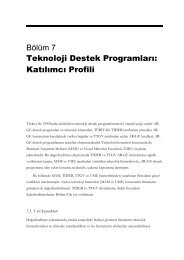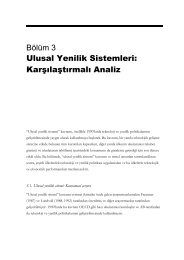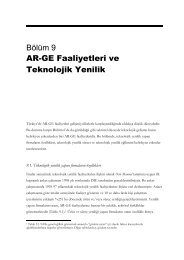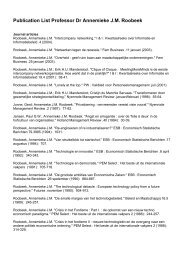The Australian Government's Innovation Report
The Australian Government's Innovation Report
The Australian Government's Innovation Report
Create successful ePaper yourself
Turn your PDF publications into a flip-book with our unique Google optimized e-Paper software.
<strong>The</strong> programme is providing $11.9 million over the five years to June 2007.<br />
Two centres of excellence have been established: the National Centre of Excellence in Functional Foods at the<br />
University of Wollongong (NFIS contribution $5.5 million over five years) and the <strong>Australian</strong> Food Safety Centre<br />
of Excellence at the University of Tasmania (NFIS contribution $4.5 million over five years). <strong>The</strong> National Centre<br />
of Excellence in Functional Foods is leading the advancement of functional foods in Australia and overseas by:<br />
• integrating activity related to diet and health in industry, scientific, regulatory and consumer domains;<br />
• participating in standards development at the national and international levels for research that<br />
substantiates the effects of functional foods;<br />
• providing critical review of the development of a regulatory framework for functional foods through<br />
responses to Food Standards Australia New Zealand (FSANZ) consultations and supplying useful regulatory<br />
information and references to companies through the website, conferences and other industry events;<br />
• providing access to knowledge on the science, market intelligence and regulatory environment relevant<br />
to functional foods; and<br />
• pooling the individual capabilities of its members.<br />
<strong>The</strong> centre has conducted 20 company consultancies with a value of more than $400 000, including a project for<br />
Uncle Toby’s to establish nutritional criteria for nutritious snacks. This resulted in a major report that has been<br />
disseminated widely to the media and health professionals and the criteria have now been adopted by Uncle<br />
Toby’s as the basis of new development guidelines for muesli bars and other nutritious snacks.<br />
<strong>The</strong> Functional Foods Centre continues to develop a portfolio of underpinning science in two key areas:<br />
Foods for Appetite Control and Foods for Healthy Ageing. Foods for Appetite Control aims to build the scientific evidence<br />
for the effects of dietary protein on appetite and satiety to underpin opportunities for innovative food products<br />
targeting weight management. Foods for Healthy Ageing focuses on oxidative stress as a function of ageing and<br />
building the science base for foods delivering protective agents such as Selenium and other antioxidants in<br />
promoting health.<br />
More information can be found at:<br />
National Food Industry Strategy Ltd – www.nfis.com.au<br />
National Centre of Excellence in Functional Foods – www.nceff.com.au<br />
<strong>Australian</strong> Food Safety Centre of Excellence – www.foodsafetycentre.com.au<br />
Healthy export<br />
<strong>The</strong>re are about 5.4 million cases of food-borne illness in Australia each year and the chilling of meat carcasses<br />
has been identified by the <strong>Australian</strong> Food Safety Centre of Excellence (AFSCOE) as a potential health hazard.<br />
In 2004-05, AFSCOE conducted a study into E. coli growth when chilling meat carcasses. This involved<br />
developing a laboratory-based model system that mimicked the temperature, water activity and water content<br />
changes of beef during <strong>Australian</strong> commercial air chilling operations.<br />
By studying the changes in E. coli populations exposed to the chilling regimes and evaluating whether combined<br />
chilling and drying regimes reduce the pathogens, AFSCOE aimed to optimise product quality and safety.<br />
In 2005-06, the study was accepted into the Revised Export (Meat and Meat Product) Control Orders 2005<br />
as a refrigeration index. <strong>The</strong> recommendations are reported to have helped maintain Australia’s position<br />
as the sixth largest exporter of unprocessed food in the world, bringing an estimated net direct benefit<br />
of $85 million a year to the <strong>Australian</strong> meat industry.<br />
Chapter 2 - Initiatives for a dynamic national innovation system 47




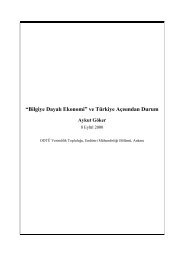
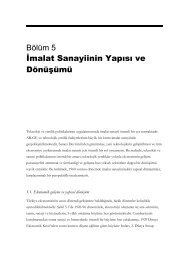
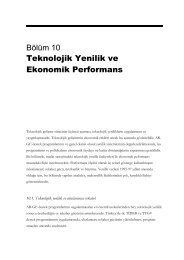

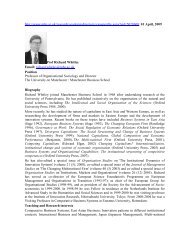

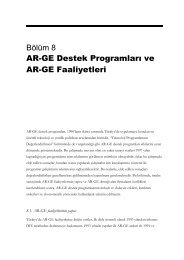
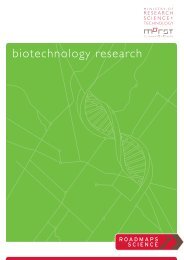
![[Tam] Uygula[ya] - Bilim, Teknoloji ve Ä°novasyon Politikaları TartıÅma ...](https://img.yumpu.com/36820041/1/184x260/tam-uygulaya-bilim-teknoloji-ve-anovasyon-politikalara-tartaama-.jpg?quality=85)
